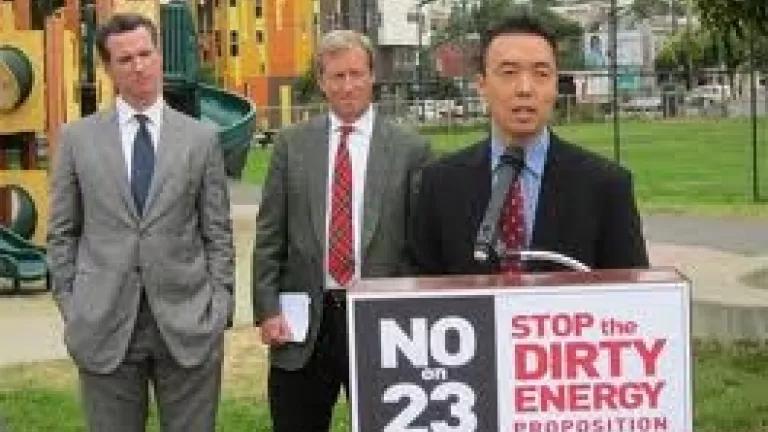
This has been an especially contentious and polarizing election season, and little room has been left for reasoned discourse. Any common ground, it seems, has subsided beneath the waves of stridency, fear and anger. But things aren’t always as they seem: despite all the hype and hot wind, here in California this election cycle has yielded a strong and powerful coalition, one that cuts across all political and social lines.
San Francisco Mayor Gavin Newsom, Investor Tom Steyer and Ian Kim of the Ella Baker Center for Human Rights speak out against Prop 23
I’m talking about the coalition we’ve pulled together to oppose Proposition 23, the California initiative that would derail AB 32, the state’s landmark clean energy law. Prop 23 is largely funded by two Texas oil companies, Valero Corp. and Tesoro Corp., and the Koch Brothers, a couple of billionaires based in Wichita who’ve made their money on petroleum, chemicals and fertilizers.
These oil companies touted Proposition 23 as a “job savings” bill, but it soon became clear that few people were fooled. Right, left, in the middle – Californians of all political stripes read the initiative’s fine print and realized they were being snookered. Far from enhancing employment, Proposition 23 would kill the tens of thousands of jobs already emerging in the clean tech sector: jobs in clean car manufacturing, solar and wind plant construction, energy efficient building construction and retrofitting, and sustainable fuel development and production. We’re used to looking forward in this state, not back – and the blatant attempt to substitute a clean and prosperous future for California with a polluted and impoverished past didn’t sit well with the electorate.
So a golden coalition emerged – a new face of the environmental movement – to fight Proposition 23, one that is all the stronger for its disparate parts. Mainline Republicans combined forces with influential Democrats and Independents. The leaders of the campaign against Proposition 23 are George Shultz, the former Secretary of State under George H.W. Bush, and Tom Steyer, the senior managing member of Farallon Capital Management. They’re joined by NRDC and other environmental groups that helped pass AB 32; internet giants Bill Gates of Microsoft and Sergey Brin of Google; Independent Energy Producers Association; labor unions, public health and community groups; the NAACP and the millions of average Californians who are demanding a prosperous, secure and sustainable economy for their state.
How’re we doing? Pretty good. While climate deniers rail against sensible policy across the national landscape, California will hopefully buck the trend. Our clean energy policies and AB 32 have already brought more than $9 billion in venture capital to the Golden State’s green industrial and commercial sectors since the passage of this game-changing legislation. Companies committed to clean energy are flocking to California to take advantage of the incentives we are creating. Tesla and Toyota are gearing up to manufacture state-of-the-art electric cars here. SunPower, a leading solar energy company, will soon employ more than 1,000 people in California, many of whom will work in the company’s new plant in Milpitas. A few weeks ago, U.S. Secretary of the Interior Ken Salazar approved construction of five large-scale solar arrays for California’s public lands, projects that will employ thousands of people and supply sustainable, pollution-free energy to two million homes.
Exciting as it is, this story isn’t just about the growing clean energy economy in California. It’s about the state pointing the way to a more civil and effective political process, one focused on solving pressing economic and social issues rather than on fomenting discord. As I noted, the coalition opposing Proposition 23 is not monolithic. We have pitched a very large tent, and we accommodate people of all political points of view. But we agree on a couple of things, and those transcend all our differences: we need to get people working, and we need to develop new sources of clean, domestic energy that support the economy and improve public health. Until we do that, everything else is a sideshow.